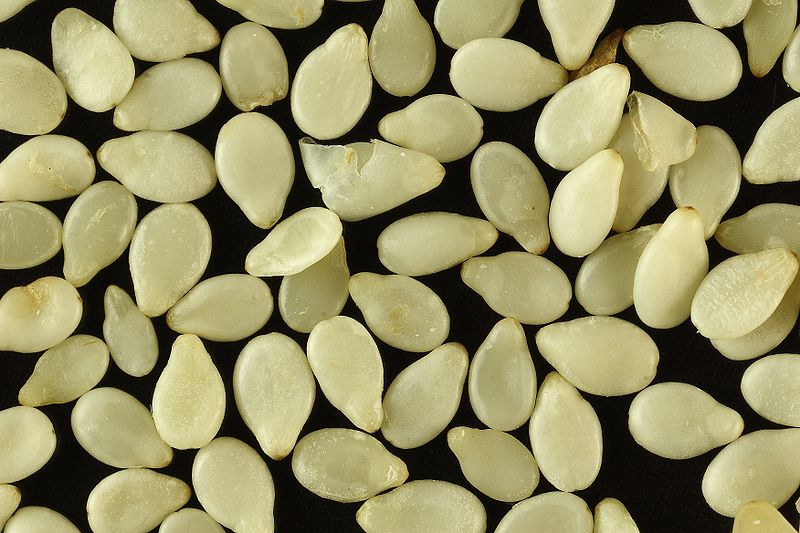Sesame seeds
2012

Sesame seeds are one of the oldest cultivated plant in the world and one of the most potent medicinal foods commonly consumed today.
About – The origin of the sesame plant is unknown, but thought to come from India. It likes hot climates and is found growing in most tropical and southern temperate climates of the world. Sesame is an annual plant that is grown primarily for its oil-rich seeds, which come in different colors from cream, tan and red to black. The sesame plant grows an average of two to four feet high and has a single hairy stalk with white and pink flowers. After the flowers blossom, their pods, which contain the seeds develop. On the inside of these pods, rows of seeds are stacked horizontally. Sesame seeds are available unhulled or hulled, with their hulls removed. Sesame seeds are highly valued for their oil which is very resistant to rancidity. A great source of concentrated sesame is tahini, a paste made from ground hulled sesame seeds that is very popular in Middle Eastern cuisine.
Nutrition – Sesame seeds are very rich in nutrients, which may be more available if they are ground first before consuming. They are high in thiamin (vit B1), and vitamin E, iron, magnesium, manganese, copper and calcium. Sesame seeds contain special lignans, two most notable ones are its sesamol and sesamin, which have been shown to have high antioxidant and anticancer properties and to reduce levels of cholesterol. The sesame lignin sesamol has been shown to possess over two dozen beneficial medicinal properties, many of which contribute to cardiovascular health. Sesamol was shown to have an anti-depressant effect on chronically stressed mice.
Sesamin has also been found to protect the liver from oxidative damage and has been shown to inhibit a wide range of cancer cells, including leukemia, and cancer of the colon, prostate, breast, lung and pancreas. Sesame also contains phytosterols, which are associated with reduced levels of blood cholesterol. They are also a very good source of fiber. Sesame has strong antibacterial and antifungal properties. In traditional Ayurvedic medicine there is a process that involves swishing sesame oil around the mouth to prevent tooth decay, bad breath and bleeding gums. Recent research has shown that it does indeed compare favorably to chemical mouthwash at reducing gingivitis and reducing streptococcus mutans, which leads to oral plaque formation.
Recently there has been a surge of scientific information showing the nutritional richness and medicinal benefits of this wonder seed. It has been shown to effectively lower blood pressure, to lower glucose levels in diabetics and as noted, has powerful anti-cancer properties.






